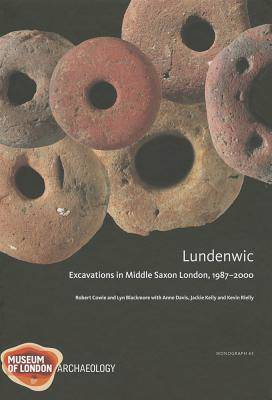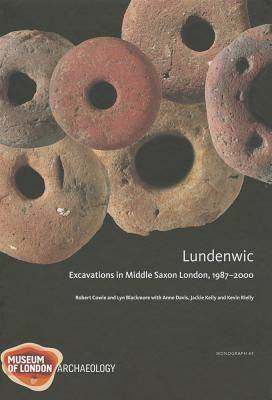
Bedankt voor het vertrouwen het afgelopen jaar! Om jou te bedanken bieden we GRATIS verzending (in België) aan op alles gedurende de hele maand januari.
- Afhalen na 1 uur in een winkel met voorraad
- In januari gratis thuislevering in België
- Ruim aanbod met 7 miljoen producten
Bedankt voor het vertrouwen het afgelopen jaar! Om jou te bedanken bieden we GRATIS verzending (in België) aan op alles gedurende de hele maand januari.
- Afhalen na 1 uur in een winkel met voorraad
- In januari gratis thuislevering in België
- Ruim aanbod met 7 miljoen producten
Zoeken
Lundenwic
Excavations in Middle Saxon London 1987-2000
Robert Cowie, Lyn Blackmore, A Davis, Jackie Keily
€ 56,95
+ 113 punten
Omschrijving
The development of the major settlement of Lundenwic in the late 7th century AD marked the rebirth of London as a town. In the following century the emporium served as a seaport for the landlocked kingdom of Mercia and played a significant role in the maritime trade of north-west Europe. This monograph provides the first detailed overview of the archaeological evidence for the trading port, placing it in its regional, national and international context. The results of fieldwork at 18 locations on the site of the former Middle Saxon settlement are followed by essays on various aspects of the settlement, including its geographical setting, activity pre-dating Lundenwic (which includes one or more cemeteries), the development, size and layout of the emporium, food production and consumption, crafts and industry, trade, dress and religion. The final section focuses on finds assemblages recovered from the settlement, including ceramics, glass, metal, and bone and antler artefacts, as well as human, animal and plant remains. Radiocarbon dates interpreted by Bayesian modelling are found to broadly accord with archaeological evidence for rapid settlement growth in the third quarter of the 7th century AD, and the first use of Ipswich ware (an important chronological marker) in London c AD 730. The volume also includes a gazetteer of sites and a timeline for the settlement and its hinterland.
Specificaties
Betrokkenen
- Auteur(s):
- Uitgeverij:
Inhoud
- Aantal bladzijden:
- 350
- Taal:
- Engels
- Reeks:
- Reeksnummer:
- nr. 63
Eigenschappen
- Productcode (EAN):
- 9781907586149
- Verschijningsdatum:
- 31/10/2012
- Uitvoering:
- Hardcover
- Formaat:
- Genaaid
- Afmetingen:
- 213 mm x 297 mm
- Gewicht:
- 1383 g

Alleen bij Standaard Boekhandel
+ 113 punten op je klantenkaart van Standaard Boekhandel
Beoordelingen
We publiceren alleen reviews die voldoen aan de voorwaarden voor reviews. Bekijk onze voorwaarden voor reviews.









